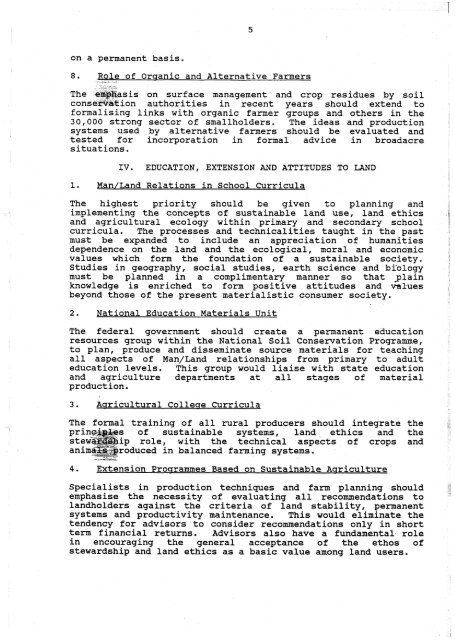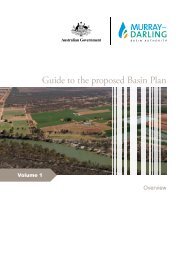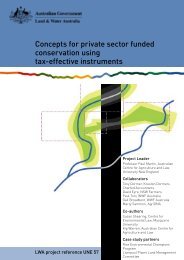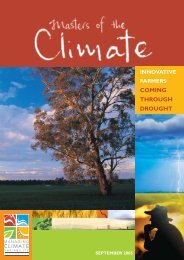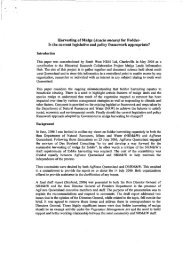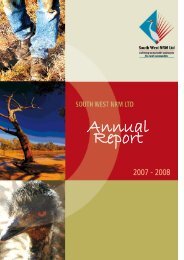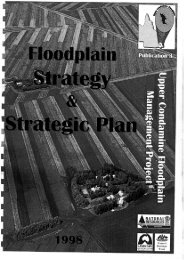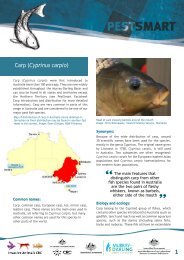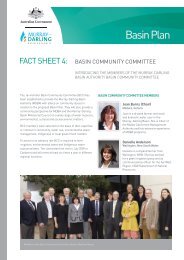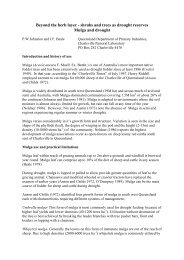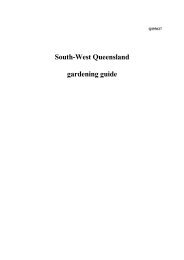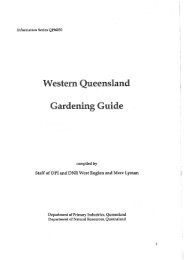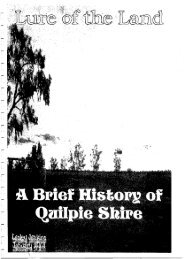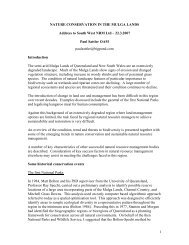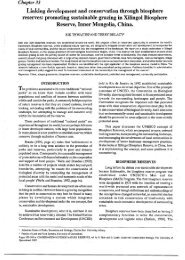soil-conservation-people-religion-and-land.pdf - South West NRM
soil-conservation-people-religion-and-land.pdf - South West NRM
soil-conservation-people-religion-and-land.pdf - South West NRM
Create successful ePaper yourself
Turn your PDF publications into a flip-book with our unique Google optimized e-Paper software.
on a permanent basis.<br />
8. Role - - of 0rqani.c <strong>and</strong> Alternative Farmers<br />
-<br />
- -<br />
-. -- < -<br />
_<br />
._-_---<br />
The -&-~is on surface management <strong>and</strong> crop residues by <strong>soil</strong><br />
conse8k~ion authorities in recent years should extend to<br />
formalising links with organic farmer groups <strong>and</strong> others in the<br />
30,000 strong sector of smallholders. The ideas <strong>and</strong> production<br />
systems used by alternative farmers should be evaluated <strong>and</strong><br />
tested for incorporation in formal advice in broadacre<br />
situations.<br />
IV. EDUCATION, EXTENSION AND ATTITUDES TO LAND<br />
1. Man/L<strong>and</strong> Relations in School Curricula<br />
The highest priority should be given to planning <strong>and</strong><br />
implementing the concepts of sustainable l<strong>and</strong> use, l<strong>and</strong> ethics<br />
<strong>and</strong> agricultural ecology within primary <strong>and</strong> secondary school<br />
curricula. The processes <strong>and</strong> technicalities taught in the past<br />
must be exp<strong>and</strong>ed to include an appreciation of humanities<br />
dependence on the l<strong>and</strong> <strong>and</strong> the ecological, moral <strong>and</strong> economic<br />
values which form the foundation of a sustainable society.<br />
Studies in geography, social studies, earth science <strong>and</strong> bi-ology<br />
must be planned in a complimentary manner so that plain<br />
knowledge is enriched to form positive attitudes <strong>and</strong> values<br />
beyond those of the present materialistic consumer society.<br />
2. National Education Materials Unit<br />
The federal government should create a permanent education<br />
resources group within the National Soil Conservation Programme,<br />
to plan, produce <strong>and</strong> disseminate source materials for teaching<br />
all aspects of Man/L<strong>and</strong> relationships from primary to adult<br />
education levels. This group would liaise with state education<br />
<strong>and</strong> agriculture departments at all stages of material<br />
production.<br />
3. Aaricultural College Curricula<br />
The formal training of all rural producers should integrate the<br />
prin~ws of sustainable systems, l<strong>and</strong> ethics <strong>and</strong> the<br />
--- role, with the technical aspects of crops <strong>and</strong><br />
anim-Broduced in balanced farming systems.<br />
-L-+-<br />
- -<br />
-----=---<br />
4. Extension Prosrammes Based on Sustainable Asriculture<br />
Specialists in production techniques <strong>and</strong> farm planning should<br />
emphasise the necessity of evaluating all recommendations to<br />
l<strong>and</strong>holders against the criteria of l<strong>and</strong> stability, permanent<br />
systems <strong>and</strong> productivity maintenance. This would eliminate the<br />
tendency for advisors to consider recommendations only in short<br />
term financial returns. Advisors also have a fundamental role<br />
in encouraging the general acceptance of the ethos of<br />
stewardship <strong>and</strong> l<strong>and</strong> ethics as a basic value among l<strong>and</strong> users.


